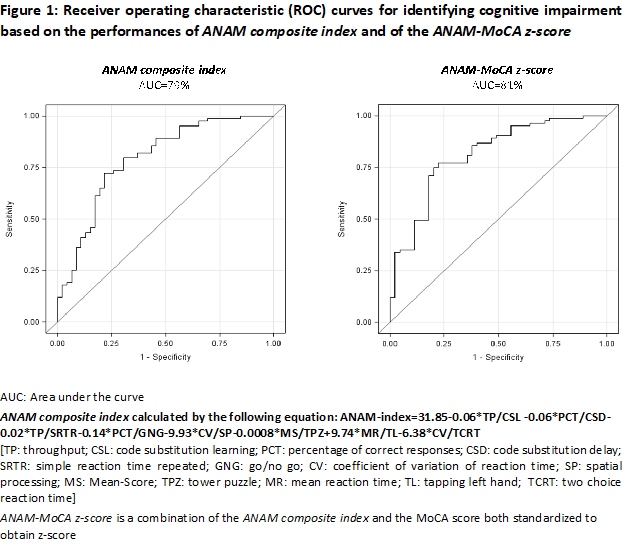Session Information
Session Type: Poster Session (Monday)
Session Time: 9:00AM-11:00AM
Background/Purpose: : In a related study, we have shown evidence to support the validity of the Automated Neuropsychological Assessment Metrics (ANAM) for the screening of cognitive impairment (CI) in adult systemic lupus erythematosus (SLE) using a novel derived ANAM composite index. The Montreal Cognitive Assessment (MoCA) is a brief assessment tool commonly used for screening of CI in the general population and SLE. The aim of this study was to assess whether the MoCA can improve the performance of the ANAM in screening for CI in SLE compared to the American College of Rheumatology (ACR) Neuropsychological Battery (NB).
Methods: Between 2016 and 2019, consecutive adult SLE patients were administered the ACR NB, MoCA and ANAM on the same day. Using age- and gender-stratified normative data, patients were classified on the ACR NB as having CI if a z-score of ≤-1.5 was observed in ≥ 2 domains; or non-CI if no domain had a z-score of ≤-1.5 An ANAM composite index was calculated for each patient according to its equation (Figure 1) using selected ANAM subtests and scores and standardized to obtain a z-score. MoCA scores were multiplied by negative 1 to make them compatible with the ANAM composite index (where a higher score corresponds to a higher probability of CI) and standardized to obtain z-scores. The z-scores of the ANAM composite index and of the MoCA were summed to achieve a combined ANAM-MoCA z-score with a mean of 0 and standard deviation of 2 and with equal weights from both instruments. The performance of the ANAM composite index and the ANAM-MoCA z-score to screen for CI against NB were evaluated using Receiver operating characteristic (ROC) curve analysis. The Area Under the Curve (AUC) was calculated for both as well as the improvement in CI identification for the combined ANAM-MoCA z-score compared to the ANAM composite index alone.
Results: 211 patients were enrolled. Mean age and SLE disease duration at study visit were 42 ± 12 years and 15 ± 10 years, respectively. CI was diagnosed by the ACR NB in 45.5% (n=96) of patients and no CI in 24.6% (n=52). The ANAM composite index showed good ability to identify CI operationalised on NB with AUC of 79% (95% confidence interval): 0.71, 0.88). Adding the MoCA score to create the ANAM-MoCA z-score demonstrated AUC of 81% (95% confidence interval: 0.73, 0.89), an improvement of 2.5% (Figure 1).
Conclusion: ANAM is a promising tool for screening of CI in SLE patients. The addition of the MoCA to the ANAM score, improves the performance of the ANAM only to a small extent but sufficient to move AUC from good to excellent category. Further research is required to enhance ANAM screening ability and usefulness.
To cite this abstract in AMA style:
Tayer-Shifman O, Green R, Beaton D, Ruttan L, Wither J, Tartaglia M, Kakvan M, Lombardi S, Anderson N, Su J, Bonilla D, Zandy M, Choi M, Fritzler M, Touma Z. Can the Montreal Cognitive Assessment (MoCA) Improve the Automated Neuropsychological Assessment Metrics (ANAM) Performance in Screening for Cognitive Impairment in Lupus Patients? [abstract]. Arthritis Rheumatol. 2019; 71 (suppl 10). https://acrabstracts.org/abstract/can-the-montreal-cognitive-assessment-moca-improve-the-automated-neuropsychological-assessment-metrics-anam-performance-in-screening-for-cognitive-impairment-in-lupus-patients/. Accessed .« Back to 2019 ACR/ARP Annual Meeting
ACR Meeting Abstracts - https://acrabstracts.org/abstract/can-the-montreal-cognitive-assessment-moca-improve-the-automated-neuropsychological-assessment-metrics-anam-performance-in-screening-for-cognitive-impairment-in-lupus-patients/

